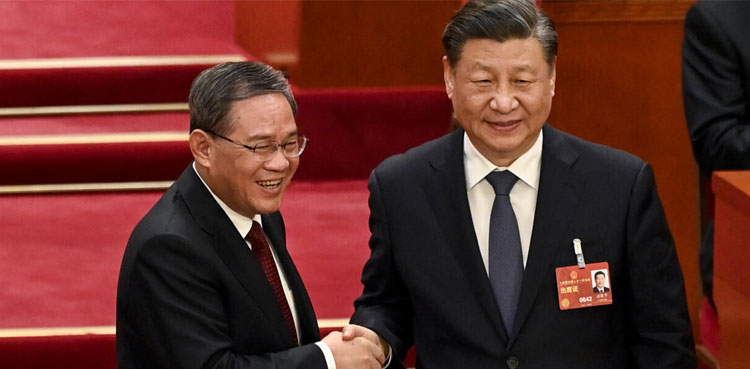
Li Qiang, one of Chinese President Xi Jinping’s most trusted allies, was confirmed as premier on Saturday, as Xi cements his influence on the country’s top leadership.
Li, the former Shanghai party chief who oversaw the city’s gruelling two-month lockdown last spring, was named the successor of outgoing premier Li Keqiang at a meeting of the country’s rubber-stamp parliament.
The 63-year-old received nearly every vote from the more than 2,900 delegates at the National People’s Congress, a day after Xi was unanimously selected by deputies for a norm-breaking third term as president.
Xi’s motion nominating Li Qiang as premier was read out to the chamber on Saturday morning.
Journalists were asked to leave the chamber as deputies, mostly dressed in dark suits, marked their ballots in a tightly choreographed process.
Delegates later applauded as Xi ceremoniously deposited his votes in the ballot box while cheerful traditional music played from speakers.
An electronic screen in the hall displayed 2,936 votes for Li, with only three delegates voting against his appointment and eight abstaining.
Li later took an oath, swearing to be loyal to China’s constitution and to “work hard to build a prosperous, strong, democratic, civilized, harmonious and great modern socialist country”.
His ascension had once seemed in doubt after his handling of the Shanghai lockdown, in which residents struggled to access food and medical care.
But Li’s record, along with widespread protests last winter over Xi’s zero-Covid policy, has been brushed aside as Xi cements his grip on Chinese politics.
Former top prosecutor Zhang Jun was appointed supreme court president at the same session on Saturday, while Ying Yong, who was party chief of Covid-hit Hubei province in the early months of the pandemic, was selected as procurator-general of the Supreme People’s Procuratorate.
– Longtime allies –
Unlike almost all previous premiers, Li does not have experience working at the central government level.
Li, who started his career as an irrigation pump station worker near his hometown, rose steadily through local government ranks and was promoted to affluent Zhejiang province’s top job in 2012.
He was Xi’s chief of staff in the early 2000s when the Chinese leader was Zhejiang’s party chief.
In 2017, Li was appointed the party secretary of Shanghai — a sign of the president’s high degree of trust in him.
Now, in his capacity as premier and head of China’s cabinet, the State Council, he will be responsible for the day-to-day running of the country as well as macroeconomic policy.
Outgoing premier Li Keqiang last week announced a growth target of “around 5 percent” for 2023, one of the lowest in decades, as the world’s number two economy fights stiff headwinds.
Last year, the Chinese economy expanded just three percent, one of its weakest performances in decades on the back of the Covid-19 pandemic, lockdowns and a real estate crisis.
China’s housing market, which along with construction accounts for more than a quarter of GDP, remains in a slump, having been dealt a hefty blow since Beijing started cracking down on excessive borrowing and rampant speculation in 2020.
Hong Kong-based Chinese politics expert Willy Lam told AFP it was unlikely Li Qiang would serve as a counterweight to Xi’s efforts to control the economy.
“Xi has doubled down on the fact there must be tighter party-state control of the economy,” Lam said.
“It is very doubtful whether Li Qiang himself will have the authority to further develop Deng Xiaoping’s reform and open door policy,” Lam added, referring to the decades-long process of opening up that has appeared to be threatened under Xi.
from International News Today - Breaking News, US News, World News https://ift.tt/G2Zyqxj
via IFTTT

0 Comments